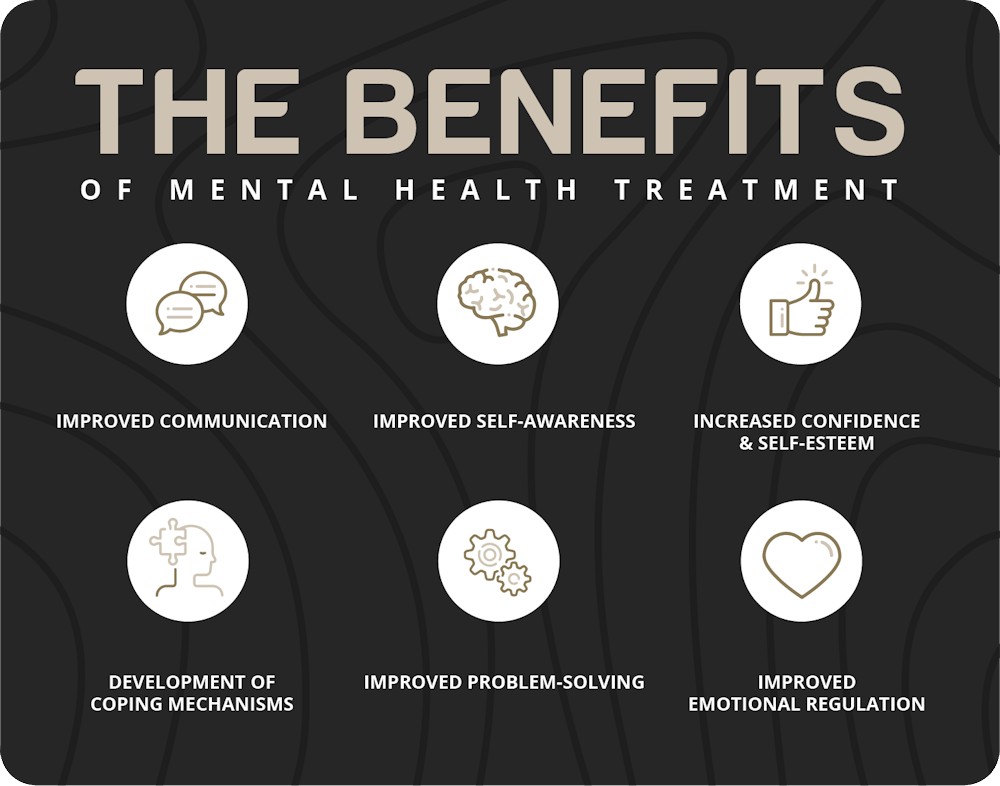7 Simple Techniques For Mental Health Counseling
7 Simple Techniques For Mental Health Counseling
Blog Article
Mental Health Counseling Things To Know Before You Get This
Table of Contents9 Simple Techniques For Mental Health CounselingSome Ideas on Mental Health Counseling You Need To KnowThe Best Guide To Mental Health CounselingThe Facts About Mental Health Counseling RevealedGetting My Mental Health Counseling To Work
With treatment, you can acquire understanding into your own patterns of habits and communication, which can bring about more meeting and pleasing relationships with pals, family members, and charming partners. What we assume, we show up. If you're eaten with negative emotions and adverse ideas that are disrupting your life, therapy can aid., or there are various other unfavorable methods you behave. Treatment can assist you modify those behaviors that are having an adverse influence on your globe and partnerships.

Obtaining therapy to attend to certain facets of your life can assist you be more efficient in various other areas, consisting of work.

Mental Health Counseling for Beginners
There are also extra advantages of therapy than simply the ones we have gone over., or construct connections (charming or those with household or good friends) in a healthy and balanced means.
For the objective of today research study, viewed advantages and obstacles to mental health help-seeking are being discovered. Previous research discovered that viewed obstacles have a significant result on university pupils' wellness behavior options (Von Ah, Ebert, Ngamvitroj, Park & Kang, 2003). Viewed advantages and barriers to help-seeking were especially selected because of their influence on decision-making and eventually activity (Glanz, Rimer, & Su, 2005).
Today study looks for to check out whether or not preconception offers as an obstacle to treatment amongst university student. Eisenberg et al. (2011) recommended that suspicion concerning therapy efficiency is an additional obstacle to participating in treatment. Research study searchings for revealed that university pupils endorsed numerous obstacles to taking part in treatment. Mental Health Counseling. Amongst these were: (1) liking to handle psychological health issue themselves, (2) not having sufficient time to take part in treatment, (3) questions about whether psychological health therapy works in remediating problems, (4) an idea that tension is normal or the issue will obtain better without treatment, (5) absence of cash, and (6) stress about what others would certainly believe if they learnt about therapy involvement.
Staff in university mental wellness facilities might be viewed as unfriendly, and long wait times for services might be "off-putting" for students. Aspects helping with more favorable attitudes are usually at the contrary post of those factors recognized as barriers.
Unknown Facts About Mental Health Counseling
One in 3 (34.6%) reported living on campus and one in 4 (23.3%) reported living with moms and dads. Nearly fifty percent of students were associated with school organizations and 1 in 10 reported being in a society or sorority. Greater than one-third of students (38.1%) reported that they had a relative or buddy with a detected mental health and wellness problem.

9 Easy Facts About Mental Health Counseling Described
Univariate F-tests recognized certain subscale items that dramatically varied. Women were much less likely than men to regard individuals that go to therapy as psychologically weak, people that go to therapy as crazy, to really feel that individuals with mental health issue ought to take care of troubles on their very own, that individuals who most likely to counseling as not able to address problems, that individuals that most likely to counseling slouch, and to really feel that individuals who most likely to view publisher site therapy are various from regular people in an unfavorable means.
In a similar way, research results revealed that females were dramatically less most likely than men to hold stigma-related perspectives. This is constant with previous research study which also found that males hold higher degrees of perceived stigma than ladies (Chandra & Minkovitz, 2006). Based on study findings, it appears that men might be much less most likely than ladies to look for therapy because of reduced viewed barriers as well as high stigma-related perspectives.
4 Simple Techniques For Mental Health Counseling
On top of that, college health professionals might use curricula targeting men with information on the advantages of mental wellness therapy and the importance of seeking help when needed. All strategies need to be assessed go now with future study to establish the effect on university pupils, particularly men. As opposed to basic populace research studies which disclose that women are extra likely to look for out psychological wellness solutions contrasted to guys (Haunstein you could try these out et al., 2006; Mackenzie, Gekoski, & Knox, 2006), the here and now research found no substantial differences in the variety of regarded obstacles to help-seeking actions based upon sex.
Researchers speculate that this is largely due to traditional social standards and sex duties that defined males based on strength and absence of emotional expression (Addis & Mahalik, 2003; Ang, Lim, Tan, & Yau, 2004; Mojtabai, 2007). In general, there have actually been mixed outcomes among the university student population pertaining to sex differences (Rosenthal & Wilson, 2008). This searching for was unexpected and might highlight that those that had received counseling had a far better concept of wait times and various other "access" obstacles that might make it challenging to start therapy. Probably, participants that have actually received therapy view more obstacles than participants that have actually not received therapy since seeking therapy services again might include concern of self-disclosing personal details to a new counselor.
Report this page